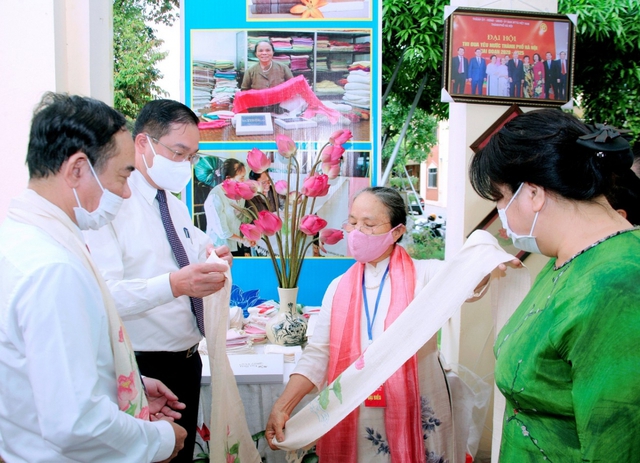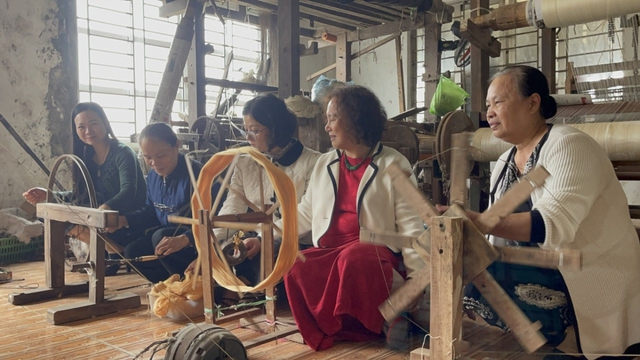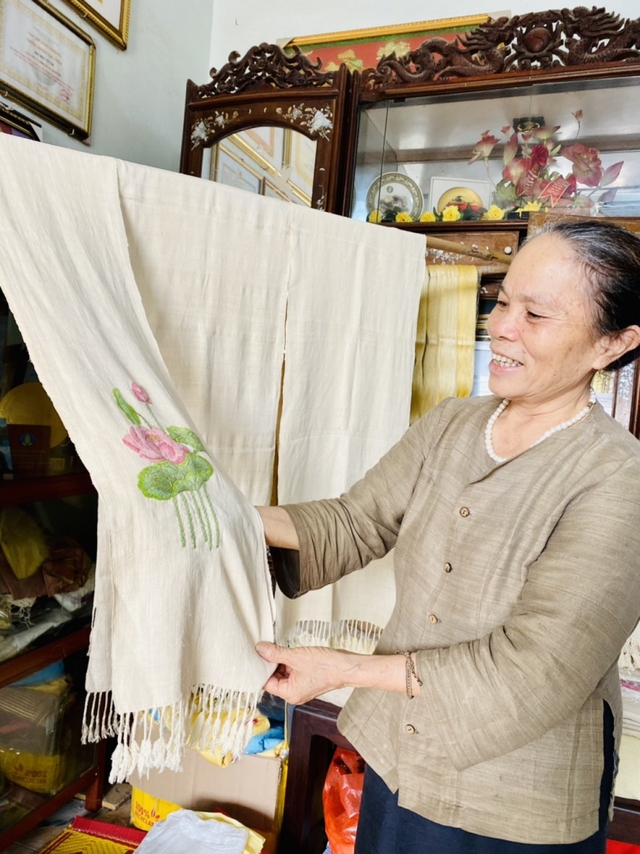The keeper of the “soul” for Phung Xa silk
Under the influence of the wave of “foreign silk” that flooded during the opening period, the once prosperous Phung Xa craft village was “three sinks – traps” in the market mechanism. In the whole village of Phung Xa, only Mrs. Phan Thi Thuan (1954) quietly built and kept the fire of the profession. Not only diligently helping the traditional craft to revive in her homeland of Phung Xa, elite artisan Phan Thi Thuan is also the owner of textile products with bold creative imprints and first appearing in Vietnam.
The profession of growing mulberries, raising silkworms, and raising silk has been around since 1929, bringing fame to Phung Xa village (Pung Xa commune, My Duc district, Hanoi). But there was a time, the peaceful Day river stood here. Seeing the mulberry, the whole village suddenly lost the sound of spinning and weaving. Villagers said that around 1984, growing mulberry trees and raising silkworms were no longer “popular”, people changed their production to rice farming for a living and gradually forgot about traditional occupations. There are ups and downs, influenced by many foreign factors, must sell Chinese products. From 2007-2008, the decline was so great that many people switched to other jobs.
During the period when mulberry farming and silk weaving in Phung Xa stood on the brink of decline, Ms. Phan Thi Thuan was working as an accountant for the mulberry industry of the agricultural cooperative. Witnessing many artisans “tipping up” with their traditional craft, the villagers unloading their looms and littering the streets, the woman lamented carrying each wooden frame, weaving it back home and reassembled it. The predestined relationship from a young age with “silkworm, mulberry leaf” made her feel a pain.
Ms. Phan Thi Thuan said: “The job of growing mulberries and raising silkworms given to me by my parents is associated with my breath and blood vessels. I remember my grandparents used to say that a mulberry leaf is a string of money. Then the silkworm eats the yellow leaves. If you know how to take care of it, it will give you a golden thread. Golden silk thread will help spinners, weavers, creating a lot of jobs for local workers. When the Mulberry Silk Corporation went bankrupt and stopped buying silkworms from My Duc, the leaders of the district and commune were interested in this traditional profession and let me find a way to develop the profession.

Indulging in exhibitions, fairs, elite artisan Phan Thi Thuan is not afraid to meet customers, partly to introduce products, partly to find out the needs of the market. Since then, she has pondered and created new products so that “soul and silk” seem to understand customers well.
“Nowadays there are many industrial machines, making it very easy, competing with our products. So I had to think about the easiest, best way to let more people do the craft like me. Like how to mix textile colors, customers who like brocade weave brocade, and if they like raw silk, they weave raw silk. I struggled to think about how to make the damaged cocoon to make use of what products, the silkworm manure to fertilize the plants, and then the pupa to make herbs, to increase the value of the product” – Ms. Phan Thi Thuan shared.
Working day and night with the silkworms, although hard, helped artisan Phan Thi Thuan create unique weaving products. In 2012, she officially introduced the first product available in Vietnam: blankets woven by silkworms without the need of a spinner or a silk nurse. For a long time, silkworms eat mulberry leaves and then release silk to form round cocoons. People take that cocoon to pull it out, turn it into golden silk threads, and then weave the fabric as they like. It’s still a feat of engineering to create a silk fabric. By understanding “like the palm of her hand” about the living habits of silkworms, Mrs. Thuan succeeded in controlling them to weave themselves onto a flat cocoon. From silk threads woven by silkworms, blankets and pillows are formed, which are as light as clouds but very solid and durable.

Mr. Le Van Nam, son of outstanding artisan Phan Thi Thuan shared: “In the beginning, no one believed, because the silkworm’s habit is to knit into a cocoon to protect the body, but now it is forced to make a flat form. To make a quilt, it sounds very vague. But she persevered, after 4-5 years of testing, there were many failures. In the end, she controlled it to do what she wanted. Because she was born in Phung Xa craft village. She has worked in the 4th generation, so she understands silkworms very well, from the time the eggs hatch into a ripe silkworm, then make a cocoon, then nurse and weave silk.

Not stopping there, artisan Phan Thi Thuan was the first person in Vietnam to study weaving silk fabric from silk fibers taken from lotus stalks, creating a product bearing the Vietnamese soul. With creative and unique ideas, she was awarded the 6th National Farmer Technical Innovation Award by the Central Committee of the Vietnam Farmers Association and the Ministry of Industry and Trade in 2015. In 2019, lotus silk was honored to be awarded The Prime Minister selected the product as a gift from Vietnam at the G20 Summit in Japan. Elite artisan Phan Thi Thuan has been honored by the Hanoi People’s Committee as one of the 9 Elite Citizens of the Capital in 2021.
The good news spread far away, customers knew about Phung Xa silk more and more, the looms in the weaving factory, which were previously covered with tarpaulin, were quiet now, but now they are bustling with the sound of shuttlecocks. Thanks to that, many silk nurseries and weavers in the village have more motivation to stick to the traditional craft. Currently, My Duc Mulberry Silk Company, led by Ms. Phan Thi Thuan, has created jobs for thousands of seasonal workers, with an average income of 4.5 million VND/month. According to Mr. Vu Manh Hai – Chairman of the Association of artisans and skilled workers in Hanoi, from an effort to revive the traditional craft, households in Phung Xa commune initially succeeded with high-quality silk products. Not only enriching individuals, but also contributing to keeping the typical beauty of the countryside along the Day River.
At the age of 70, the age when many people just want to rest, the elite artisan Phan Thi Thuan still sticks to the traditional craft. Wrinkles were rippled on her face, but her eyes exuded the spirit of a silk-spinner, silk-weaver for many generations, and her voice was clear and strong. She is still engrossed in the silkworms, so that the sound of the rattle will remain in her homeland, Phung Xa.
at Blogtuan.info – Source: cafebiz.vn – Read the original article here



